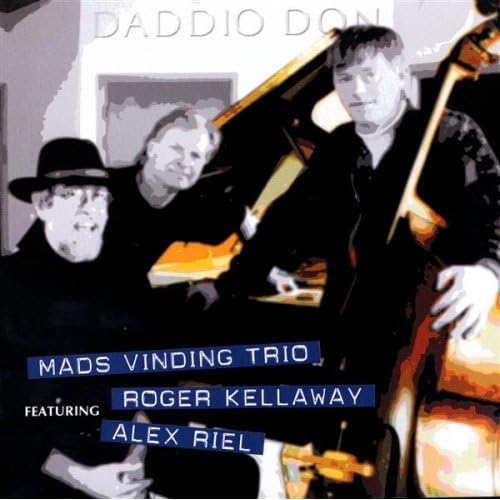| Image courtesy of soundcloud |
Recent listening, current
Archived listening, 2013-2016
Thursday, April 24, 2014
193. Mads Vinding Trio / Daddio Don (1998)
A while back, I recommended an album with Mads Vinding to a friend who loves the upright bass. It's his favorite instrument. We chatted about the Danish bassist and both agreed he's a hard one to not like. A few weeks later he gave me some CDs that, for whatever reason, didn't pan out for him the way he expected. It happens. But I was thrilled because among them was Daddio Don. I listened to it for the rest of the afternoon before promoting it to a coveted spot in the rotation of my daily commute. Vinding is impossible to keep up with, the tireless recording and performing artist for whom the word "prolific" seems inadequate. He's all over the map, discographically speaking, but always right where you need him with the soulful interplay, keen rhythmical knack, and melodic inventions that surpass keeping time for the time's sake. He has a sixth sense for interplay, or a humble ear for the group dynamic, always listening to what the other musicians are doing. I appreciate his earnest touch with the blues and immediate facility for navigating uptempo and bebop that remind me of Ray Brown (another favorite musician). His choruses are not boring, they're more like short songs. To paraphrase C. Michael Bailey's piece for AllAboutJazz.com, Vinding is like the Nordic George Mraz, expressing himself with a confident stride and robust tone that tricks the ear into hearing a full rhythm section where none is present. The trio is comprised of Vinding, drummer Alex Riel, and pianist Roger Kellaway. Kellaway has a sensitive understanding of the piano's dynamics, and moves with irresistible swing.
More importantly, Kellaway has a penchant for odd time signatures (the album is titled for Don Ellis), and all three musicians are comfortable breezing through meters like Kellaway's "Seven," or Thad Jones' "A Child is Born" in 11/8. Riel's timekeeping is sumptuously alert. His dreamy brush work is punctuated by pertinent, percussive accents and taut interjections on the snare that make the emotive and pensive, often introspective set as lush and flush as a well arranged quintet. "How Deep is the Ocean" is intriguing, demonstrating the shared chemistry of the trio. It's a touch faster than is typical, and the order of its open sections are negotiated as you hear them. It typifies the musical cooperation which is the album's hallmark. If you're the type of listener that enjoys quiet spaces with tricky corners, a shared creation of three musicians that reveals the sheer clumsiness of language when describing a mere "piano" trio, then Daddio Don needs to be on your list. And if you try it but you don't enjoy it, perhaps you can pass it on to a friend.
Saturday, April 19, 2014
192. John Scofield - A Moment's Peace (2011)
Like any other artist, John Scofield is no stranger to the ballad, which is amply represented in his back catalog and live repertoire. But A Moment's Peace is the guitarists first album consisting entirely of ballads (Scofield's albums are big on themes, anyway). It's a really enjoyable set of standards with Brian Blade, Larry Goldings, and Scott Colley on hand to help out. They deserve congratulations because while anybody will recognize these tunes, when the band locks in with Sco in the lead for emotive rushes like "I Want to Talk About You," or the slippery bends and bluesy explorations of "Gee Baby Ain't I Good to You," it's still pure magic, despite the age of the music. Scofield's guitar is heard in a judiciously reverberant, tone saturated signal that is occasionally augmented by simple effects like tremolo, or Scofield rolling the volume knob for shading and dynamics. I love that technique, especially when Blade is playing sympathetically, and Goldings starts to use the draw bars in the same track... the cumulative effect of both instruments pulsing together creates a blissfully disorienting sonic texture that shimmers like light reflecting on a water surface. A Moment's Peace was good when I heard it three years ago, and it is getting better. Highly recommended.
Friday, April 11, 2014
191. Fred Hersch - Alone at the Vanguard (2011)
Hersch plays in his characteristically slick and lyrical style in this collection of live, solo recordings. The gently meandering set is just over an hour long but
was culled from an entire week of performances at the Vanguard in 2010. Hersch's back catalog of superb trio records has given him all the leeway that could be expected from the trio format, but alone, he is free to wander a little farther from the yard, in both time and route, as with Sonny Rollins' "Doxy," or the elegant salute to Thelonious Monk's "Work." In the absence of the drums and bass, he develops sweeping melodic arcs in each piece, and displays refined senses of harmony and dynamics. With several numbers he tips his hat to inspiration from friends and figures like Robert Schumann, Bill Frisell, and Lee Konitz. My favorite piece is the disc's opener that I know as a favorite Frank Sinatra song (although it has been covered countless times since). "In the Wee Small Hours of the Morning" is rendered so poignantly as to touch the emotional depth achieved by Sinatra on the 1955 album.
Labels:
2010,
2011,
alone at the vanguard,
fred hersch,
jazz,
live,
palmetto,
piano,
review,
solo,
tribute
Subscribe to:
Posts (Atom)


